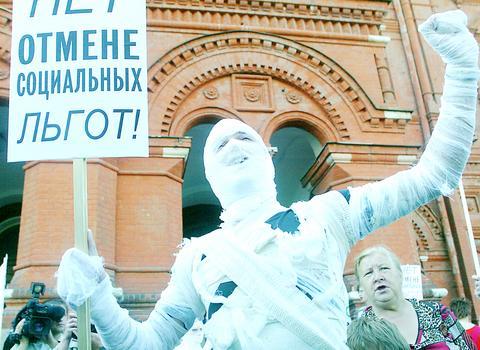A bill to end an array of Soviet-era benefits for the elderly and disabled, including free transportation and medicine, was approved by the lower house of Russia's parliament yesterday, making the measure almost certain to become law.
The government-backed legislation was approved 309-118 in the 450-seat State Duma, which is dominated by the pro-Kremlin United Russia party. Communist and nationalist legislators vehemently opposed it.

PHOTO: REUTERS
"This law contradicts the constitution and is against the people," said Communist lawmaker Valentin Romanov.
A small group of elderly protesters stood across the street from the Duma building, but the gathering was far smaller than large protests that had gathered in weeks against the legislation.
With the Duma's approval, the measure now goes to the Federation Council, the upper chamber that is seen as largely a rubber-stamp mechanism for the Kremlin. The council is expected to approve the bill on Sunday, after which it would be presented to President Vladimir Putin to be signed into law.
The measure calls for ending many of the long-standing benefits received by tens of millions of Russia's most vulnerable citizens, including the elderly, the disabled and World War II veterans, and to replace them with cash payments.
The government says the move to strip many of the Soviet-era benefits is a key step toward streamlining a lumbering bureaucracy and will be a boon to many. But recipients are outraged at what they see as abandonment by the state they served.
"The benefits have been given by the state to those who have deserved them by labor or heroic deeds and taking them away is like spitting in people's faces," said Valentina Ivanova, 67, a demonstrator.
"What they are doing is putting us in our coffins alive," she said.
The bill affects an estimated 30 million people, who constitute Russia's most vulnerable population segments.
It eliminates free access to urban transportation, free home phone use for local calls, free provision of artificial limbs, job guarantees for the disabled and, for many, free medicine. In return, they'll get monthly cash payments ranging from 1,550 rubles (US$53) down to 150 rubles (US$5.10).
Proponents of the bill say substituting cash for benefits will make aid more accurately targeted -- arguing, for example, that public transportation is scarce in rural areas.
But opponents have a raft of arguments: cash payments are vulnerable to inflation, the notoriously inefficient Russian authorities may fall months behind in the payments and the cash payments won't be enough to make up for the losses.
Under a so-called "social package" provision, medicine and some other benefits such as suburban train transport will be provided. But recipients of the social package will have 450 rubles (US$15.50) a month deducted from their new compensation payments; it is also not clear whether all the medicines currently provided free would be included in the package.

PRECARIOUS RELATIONS: Commentators in Saudi Arabia accuse the UAE of growing too bold, backing forces at odds with Saudi interests in various conflicts A Saudi Arabian media campaign targeting the United Arab Emirates (UAE) has deepened the Gulf’s worst row in years, stoking fears of a damaging fall-out in the financial heart of the Middle East. Fiery accusations of rights abuses and betrayal have circulated for weeks in state-run and social media after a brief conflict in Yemen, where Saudi airstrikes quelled an offensive by UAE-backed separatists. The United Arab Emirates is “investing in chaos and supporting secessionists” from Libya to Yemen and the Horn of Africa, Saudi Arabia’s al-Ekhbariya TV charged in a report this week. Such invective has been unheard of

US President Donald Trump on Saturday warned Canada that if it concludes a trade deal with China, he would impose a 100 percent tariff on all goods coming over the border. Relations between the US and its northern neighbor have been rocky since Trump returned to the White House a year ago, with spats over trade and Canadian Prime Minister Mark Carney decrying a “rupture” in the US-led global order. During a visit to Beijing earlier this month, Carney hailed a “new strategic partnership” with China that resulted in a “preliminary, but landmark trade agreement” to reduce tariffs — but

Chinese President Xi Jinping’s (習近平) purge of his most senior general is driven by his effort to both secure “total control” of his military and root out corruption, US Ambassador to China David Perdue said told Bloomberg Television yesterday. The probe into Zhang Youxia (張又俠), Xi’s second-in-command, announced over the weekend, is a “major development,” Perdue said, citing the family connections the vice chair of China’s apex military commission has with Xi. Chinese authorities said Zhang was being investigated for suspected serious discipline and law violations, without disclosing further details. “I take him at his word that there’s a corruption effort under

China executed 11 people linked to Myanmar criminal gangs, including “key members” of telecom scam operations, state media reported yesterday, as Beijing toughens its response to the sprawling, transnational industry. Fraud compounds where scammers lure Internet users into fake romantic relationships and cryptocurrency investments have flourished across Southeast Asia, including in Myanmar. Initially largely targeting Chinese speakers, the criminal groups behind the compounds have expanded operations into multiple languages to steal from victims around the world. Those conducting the scams are sometimes willing con artists, and other times trafficked foreign nationals forced to work. In the past few years, Beijing has stepped up cooperation